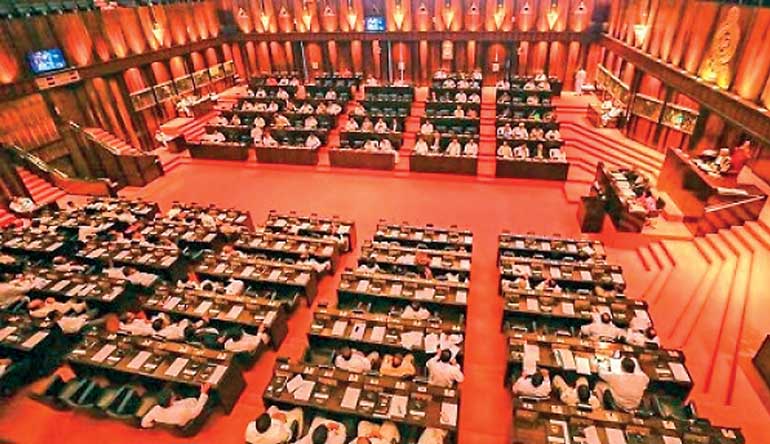Thursday Feb 19, 2026
Thursday Feb 19, 2026
Wednesday, 24 August 2016 00:01 - - {{hitsCtrl.values.hits}}

Even today, after a historic defeat of an all-powerful President and removal of substantial powers of presidency and the establishment of independent commissions, the three wheels of good governance – the Government, the State and the people – seem to wobble along unable to realign themselves to new norms of behaviour
By the end of 2014, after years of an extremely powerful presidency, the line dividing right and wrong had moved towards wrong. Rogue behaviour among Ministers and Parliamentarians, senior or junior officials, provincial and local politicians had become the norm in Sri Lanka.
Even today, after a historic defeat of an all-powerful President and removal of substantial powers of presidency and the establishment of independent commissions, the three wheels of good governance – the Government, the State and the people – seem to wobble along unable to realign themselves to new norms of behaviour.
Rogue ministers and rogue officials undermining Yahapalanaya?
As many have said before, politicians and public officials are merely reflections of society which they represent or serve. Their  rogue behaviour reflects the acceptance of rogue behaviour in society. The sardonic remark that we need to elect a new people is cute, but of little practical value. The wheels of government and the state need to be straightened and realigned – but some rogue ministers and officials do not seem to have got the Yahapalana memo.
rogue behaviour reflects the acceptance of rogue behaviour in society. The sardonic remark that we need to elect a new people is cute, but of little practical value. The wheels of government and the state need to be straightened and realigned – but some rogue ministers and officials do not seem to have got the Yahapalana memo.
As I write, a not-so-senior public official is being harassed by a Senior Minister for not letting through some shady tenders. The senior officials are playing along with the Minister, forcing the officer’s hand, seemingly not registering that they can be held accountable if they allow the misuse of public funds as a result of these manipulations.
After 18 months of a Yahapalana or good governance Presidency, and 12 months of a Government elected on a Yahapalana platform, we are yet to see any rogue politicians or officials from the past convicted for misuse of public funds. Many arrests, but no convictions yet. No wonder the rogues are emboldened and the meek are relenting.
The fact that the present Government is a minority one dependent on some of the same rogues for survival is perhaps a factor. As I see it, there are three ways keeping the Yahapalana agenda on track. First and second, the events leading up the presidential election tells us that honest officials supporting each other and civil society stepping up pressure can be effective. Thirdly, we need to constantly educate ourselves about the newly-established Commissions and learn what we can achieve through those.
Honest officials should support each other
July 14, 2016 was a special day because a Police officer was felicitated by civil society organisations in an elaborate ceremony worthy of the officer. The police officer was Gamini Navaratne, the retiring Senior Deputy Inspector General of Police for Administration and Election.
We are all familiar with the role played by Mahinda Deshapriya who reenergised the voters and officials running the 2015 presidential election when he went on record on 7 August 2015, on the eve Presidential election, saying, “Why shoot below the knee? If anybody comes into polling station to tamper with polling boxes, shoot them in the head I would say.”
He will be rightly remembered with gratitude for those words for a long time, but in the Commissioner’s own words in the introduction to the book published in the event of Navaratne’s felicitation on 14 July, he says:
“Last year we held two national level elections – the presidential and the general. Of those two much is talked about the presidential election. As far as the Department of Elections is concerned, all elections are equally important to us, but, if the majority of people want to credit us with exceptional service at the presidential election of 2015, I would humbly accept the honour under one condition. My condition is that most of the credit should go to former Senior Deputy IGP Navaratne and his team. It is true that I played a critical role in the past presidential election and I seem to have emerged as the ‘main actor’ of a political drama. However, the behind the scene, the whole drama was produced and enacted by Navaratne and his team.”
In his speech Navaratne recalled how critical was the “shoot in the head” speech by the Commissioner Deshapriya in giving moral strength to his team of Police officers, and he further revealed details of how the two worked in close collaboration.
I am fortunate to know some other exemplary officials in public service. Although none come close to having the Deshapriya-Navaratne kind of powerful partnership, it is heartening to note that a small network of these officials is emerging. If the present government does not do its part and support this network by speeding up the cases against the rogues, these honest officers will be over powered by rogues again.
Civil society has to keep up the pressure
July 14, 2016 was a special day for a second reason. The same day I was fortunate to attend the re-launch of the Manthri.lk website by Verite Research. The event was well-attended by Parliamentarians from all parties. The sensitivity shown by young Parliamentarians to the performance indices of Manthri.lk was particularly heartening.
The current focus of Verite is on the legislative performance of MPs. A second track of performance measures for the Cabinet of Ministers and the senior officials too is needed. Parliament is trying reinvigorate the Oversight Committees for Ministries, but without civil society oversight, these Committee reports will be buried in the Parliamentary web site.
Purawesi Peramuna and other Yahapalana organisations too are active, but we need a more concerted approach. In the case of some rogue ministers, they seem to be critical actors in a difficult balancing act of maintaining a post-election coalition, but we should not give up.
Independent Commissions need to be tapped
The original 1978 Constitution vested all authority over public officials in the Cabinet through Article 55 which said “Subject to the provisions of the Constitution, the appointment, transfer, dismissal disciplinary control of all public officials is hereby vested in the Cabinet of Ministers and all public officers shall hold office at pleasure.” It sounds draconian although there were laws and conditions which made it not so easy to fire a public official.
The 19th amendment replaces Article 55 it by new clauses which gave the Cabinet of Ministers only the powers relating to appointments, promotions, transfers, disciplinary control and dismissal of heads of departments, and policies relating to all appointments, promotions, transfers, disciplinary control and dismissals. Powers over the public officials other than the heads of department are vested with an empowered Public Service Commission.
Statutory bodies established under specific acts are outside of purview of the Public Service Commission. They are governed by provisions in the respective Acts where, typically, the governing board of the entity has full authority to appointment, promote, transfer or disciplinary control and dismissal of its staff. However, a minister may fire the governing board without assigning any reason. Although the staff can still resort legal procedures if due process is not followed, staff in these authorities are more vulnerable if they choose to follow the law in the face of undue influence by a minister.